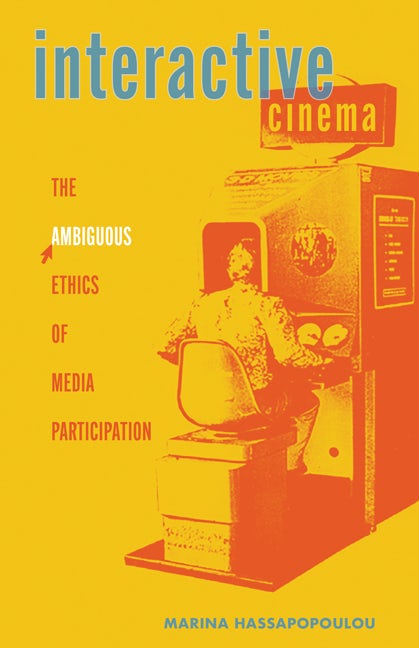YOU'RE INVITED: Interactive Cinema Book Celebration

Friday, November 15, 6:00pm
Michelson Theater, 721 Broadway, Room 648
Join us on Friday, November 15 at 6:00pm for a celebration of Marina Hassapopoulou's new book, Interactive Cinema: The Ambiguous Ethics of Media Participation (University of Minnesota Press, 2024).
The event will include a participatory screening of Kinoautomat, the first feature-length choose-your-own-adventure "vending machine" movie by Czechoslovak filmmaker Radúz Činčera that premiered at Expo 67 in Montreal. The book event will also include a special showcase of emulators from the Cinema Studies department's interactive CD- and DVD-ROM collection, featuring some of the variable media from the 1990s-early 2000s analyzed in the book so that you can interact with them in person. The showcase will take place between 10:30 am and 4:00pm in the Film Study Center and a viewing appointment request is required.
To make a viewing appointment request for the interactive showcase, contact Cristina Cajulis cmc673@nyu.edu.
This is an in-person event, open to the public. Prior registration is required at least 24 hours before the start of the event. Non-NYU attendees will receive emailed instructions for building access and may be asked to present a government-issued photo ID upon arrival. NYU attendees must present their NYU ID.
About the Book
Interactive Cinema explores various cinematic practices that work to transform what is often seen as a primarily receptive activity into a participatory, multimedia experience. Surveying a multitude of unorthodox approaches throughout the history of motion pictures, Marina Hassapopoulou offers insight into a range of largely ephemeral and site-specific projects that consciously assimilate viewers into their production.
Analyzing examples of early cinema, Hollywood B movies, museum and gallery installations, virtual-reality experiments, and experimental web-based works, Hassapopoulou travels across numerous platforms, highlighting a diverse array of strategies that attempt to unsettle the allegedly passive spectatorship of traditional cinema. Through an exploration of these radically inventive approaches to the medium, many of which emerged out of sociopolitical crises and periods of historical transition, she works to expand notions of interactivity by considering it in both technological and phenomenological terms.
Deliberately revising and expanding Eurocentric scholarship to propose a much broader, transnational scope, the book emphasizes the ethical dimensions of interactive media and their links to larger considerations around community building, citizenship, and democracy. By combining cutting-edge theory with updated conventional film studies methodologies, Interactive Cinema presses at the conceptual limits of cinema and offers an essential road map to the rapidly evolving landscape of contemporary media.